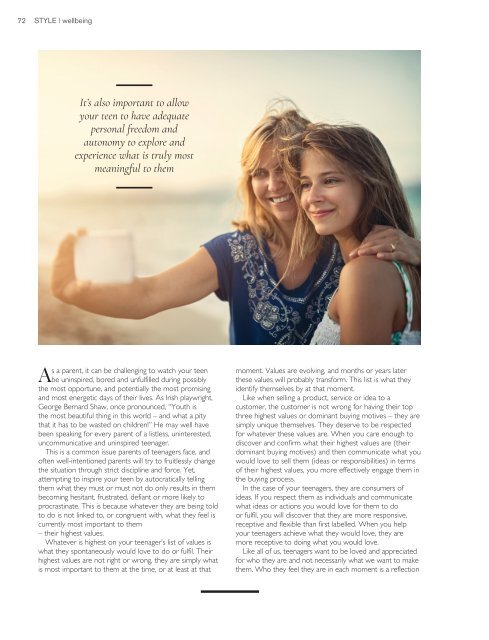Create successful ePaper yourself
Turn your PDF publications into a flip-book with our unique Google optimized e-Paper software.
72 STYLE | wellbeing<br />
It’s also important to allow<br />
your teen to have adequate<br />
personal freedom and<br />
autonomy to explore and<br />
experience what is truly most<br />
meaningful to them<br />
As a parent, it can be challenging to watch your teen<br />
be uninspired, bored and unfulfilled during possibly<br />
the most opportune, and potentially the most promising<br />
and most energetic days of their lives. As Irish playwright,<br />
George Bernard Shaw, once pronounced, “Youth is<br />
the most beautiful thing in this world – and what a pity<br />
that it has to be wasted on children!” He may well have<br />
been speaking for every parent of a listless, uninterested,<br />
uncommunicative and uninspired teenager.<br />
This is a common issue parents of teenagers face, and<br />
often well-intentioned parents will try to fruitlessly change<br />
the situation through strict discipline and force. Yet,<br />
attempting to inspire your teen by autocratically telling<br />
them what they must or must not do only results in them<br />
becoming hesitant, frustrated, defiant or more likely to<br />
procrastinate. This is because whatever they are being told<br />
to do is not linked to, or congruent with, what they feel is<br />
currently most important to them<br />
– their highest values.<br />
Whatever is highest on your teenager’s list of values is<br />
what they spontaneously would love to do or fulfil. Their<br />
highest values are not right or wrong, they are simply what<br />
is most important to them at the time, or at least at that<br />
moment. Values are evolving, and months or years later<br />
these values will probably transform. This list is what they<br />
identify themselves by at that moment.<br />
Like when selling a product, service or idea to a<br />
customer, the customer is not wrong for having their top<br />
three highest values or dominant buying motives – they are<br />
simply unique themselves. They deserve to be respected<br />
for whatever these values are. When you care enough to<br />
discover and confirm what their highest values are (their<br />
dominant buying motives) and then communicate what you<br />
would love to sell them (ideas or responsibilities) in terms<br />
of their highest values, you more effectively engage them in<br />
the buying process.<br />
In the case of your teenagers, they are consumers of<br />
ideas. If you respect them as individuals and communicate<br />
what ideas or actions you would love for them to do<br />
or fulfil, you will discover that they are more responsive,<br />
receptive and flexible than first labelled. When you help<br />
your teenagers achieve what they would love, they are<br />
more receptive to doing what you would love.<br />
Like all of us, teenagers want to be loved and appreciated<br />
for who they are and not necessarily what we want to make<br />
them. Who they feel they are in each moment is a reflection


















